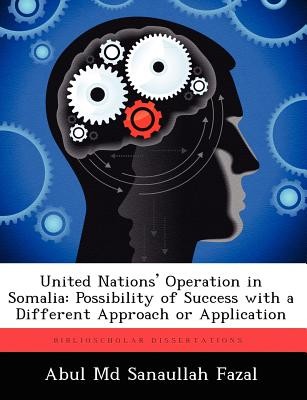
- We will send in 10–14 business days.
- Author: Abul Sanaullah Fazal
- Publisher: BiblioScholar
- ISBN-10: 1249428475
- ISBN-13: 9781249428473
- Format: 18.9 x 24.6 x 0.7 cm, softcover
- Language: English
- SAVE -10% with code: EXTRA
Reviews
Description
This study examines whether the UN Operation in Somalia could have succeeded with a different approach or application. Somalia plunged into catastrophic humanitarian crises amidst brutality by the repressive regime and the civil war that followed its overthrow in January 1991. After a costly lapse of time, the UN undertook a peacekeeping operation in Somalia on 24 April 1992 with the adoption of Security Council Resolution 751. During the next three years of involvement, the UN sought to alleviate human suffering, disarm the factions, and institute a government--areas that would eventually determine success or failure. Given the major turns of events, the UN proved unequal to the task in each stage because of a chain of continuing flaws. However, this study suggests that chances for success were there and a different approach and application were needed. First, an early involvement could have yielded a positive outcome. Second, decisive and pragmatic approach during the United Nations Operation in Somalia (UNOSOM) I promised to be yet another way of being successful. The last possibility of success was linked with ability to capitalize on and continue the improved security and humanitarian situations that was achieved by the Unified Task Force. This particular possibility, as the study recommends, was the most practicable one.
EXTRA 10 % discount with code: EXTRA
The promotion ends in 17d.02:13:06
The discount code is valid when purchasing from 10 €. Discounts do not stack.
- Author: Abul Sanaullah Fazal
- Publisher: BiblioScholar
- ISBN-10: 1249428475
- ISBN-13: 9781249428473
- Format: 18.9 x 24.6 x 0.7 cm, softcover
- Language: English English
This study examines whether the UN Operation in Somalia could have succeeded with a different approach or application. Somalia plunged into catastrophic humanitarian crises amidst brutality by the repressive regime and the civil war that followed its overthrow in January 1991. After a costly lapse of time, the UN undertook a peacekeeping operation in Somalia on 24 April 1992 with the adoption of Security Council Resolution 751. During the next three years of involvement, the UN sought to alleviate human suffering, disarm the factions, and institute a government--areas that would eventually determine success or failure. Given the major turns of events, the UN proved unequal to the task in each stage because of a chain of continuing flaws. However, this study suggests that chances for success were there and a different approach and application were needed. First, an early involvement could have yielded a positive outcome. Second, decisive and pragmatic approach during the United Nations Operation in Somalia (UNOSOM) I promised to be yet another way of being successful. The last possibility of success was linked with ability to capitalize on and continue the improved security and humanitarian situations that was achieved by the Unified Task Force. This particular possibility, as the study recommends, was the most practicable one.


Reviews